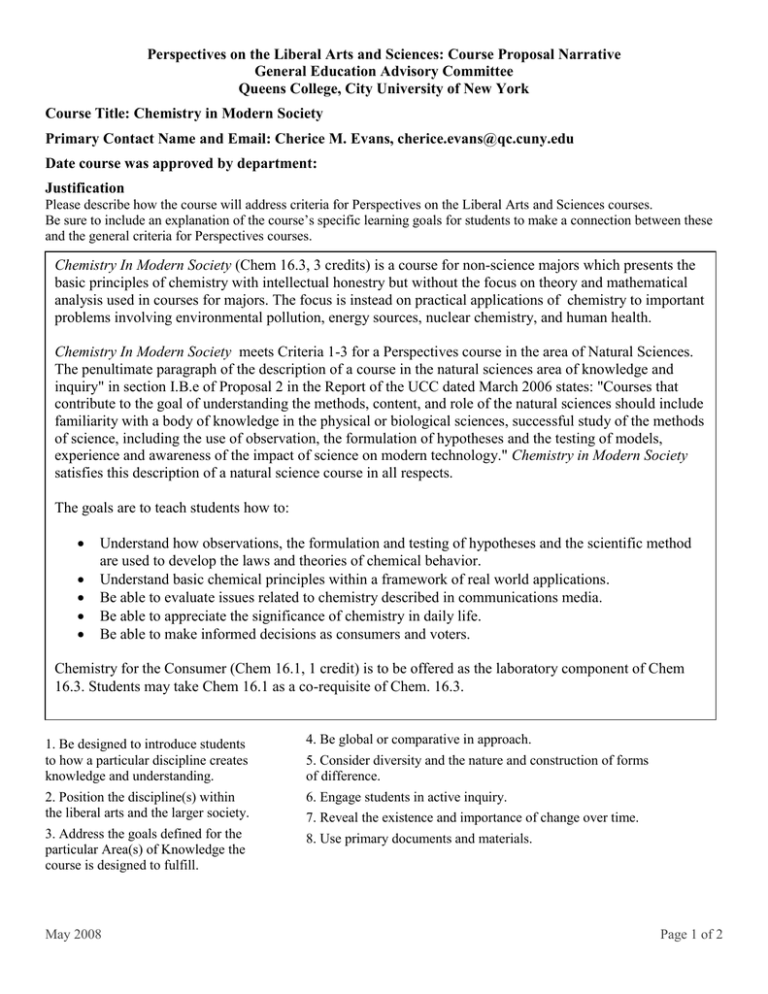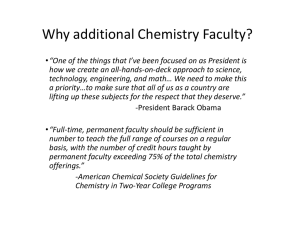Perspectives on the Liberal Arts and Sciences: Course Proposal Narrative
advertisement

Perspectives on the Liberal Arts and Sciences: Course Proposal Narrative General Education Advisory Committee Queens College, City University of New York Course Title: Chemistry in Modern Society Primary Contact Name and Email: Cherice M. Evans, cherice.evans@qc.cuny.edu Date course was approved by department: Justification Please describe how the course will address criteria for Perspectives on the Liberal Arts and Sciences courses. Be sure to include an explanation of the course’s specific learning goals for students to make a connection between these and the general criteria for Perspectives courses. Chemistry In Modern Society (Chem 16.3, 3 credits) is a course for non-science majors which presents the basic principles of chemistry with intellectual honestry but without the focus on theory and mathematical analysis used in courses for majors. The focus is instead on practical applications of chemistry to important problems involving environmental pollution, energy sources, nuclear chemistry, and human health. Chemistry In Modern Society meets Criteria 1-3 for a Perspectives course in the area of Natural Sciences. The penultimate paragraph of the description of a course in the natural sciences area of knowledge and inquiry" in section I.B.e of Proposal 2 in the Report of the UCC dated March 2006 states: "Courses that contribute to the goal of understanding the methods, content, and role of the natural sciences should include familiarity with a body of knowledge in the physical or biological sciences, successful study of the methods of science, including the use of observation, the formulation of hypotheses and the testing of models, experience and awareness of the impact of science on modern technology." Chemistry in Modern Society satisfies this description of a natural science course in all respects. The goals are to teach students how to: Understand how observations, the formulation and testing of hypotheses and the scientific method are used to develop the laws and theories of chemical behavior. Understand basic chemical principles within a framework of real world applications. Be able to evaluate issues related to chemistry described in communications media. Be able to appreciate the significance of chemistry in daily life. Be able to make informed decisions as consumers and voters. Criteria Checklist Please be sure that your justification addresses all three criteria 1-3, below. For criteria 4-8, please check all that apply and discuss these in your justification. Chemistry for the Consumer (Chem 16.1, 1 credit) is to be offered as the laboratory component of Chem Students maymust: take Chem 16.1 as a co-requisite Chem. 16.3. A16.3. Perspectives course In addition, aofPerspectives course will, where appropriate to its discipline(s) and subject matter: 1. Be designed to introduce students to how a particular discipline creates knowledge and understanding. 4. Be global or comparative in approach. 2. Position the discipline(s) within the liberal arts and the larger society. 3. Address the goals defined for the particular Area(s) of Knowledge the course is designed to fulfill. 6. Engage students in active inquiry. May 2008 5. Consider diversity and the nature and construction of forms of difference. 7. Reveal the existence and importance of change over time. 8. Use primary documents and materials. Page 1 of 2 Course Materials, Assignments, and Activities Please provide an annotated list of course readings and descriptions of major assignments or exams for the course, as well as distinctive student activities that will engage students in working toward the course goals discussed in the course description and/or justification. Please include the author and title for each reading or text, along with a short description providing information about how the reading will contribute to course goals. The required textbook is Chemistry for Changing Times by John W. Hill, Terry McCready, Doris K. Kolb, 12th Ed, Pearson Prentice Hall, 2010. The Study Guide and Selected Solutions Manual for Chemistry for Changing Times , by Richard Jones, 12th Ed., Pearson Prentice Hall, 2010, is optional. Students are required to work at least the odd numbered problems in the textbook. Slides shown during lectures are posted on the course's Black Board site. Self tests with answers for all of the chapters covered by the three hour exams are posted on the course's Black Board site. A report on Chemistry in the News is required. The instructions for this assignment in the syllabus are: Minimum: To raise your overall grade by 1 to 2 points, submit a clipping from a newspaper, magazine or other source about a topic that involves chemistry (food, environment, medicine, household products, nuclear issues, global warming, etc. ) and a brief essay which explains why you think the topic is important. Option to do better than the minimum: To raise your grade by 3 to 5 points, do one of the following: 1. Submit more than one clipping and report 2. Base a report on a number of clippings about a particular issue. 3. Study the topic of a newspaper article using library and up-to-date and trustworthy internet resources and describe your findings in a report. Assessment Perspectives courses must be recertified every five years, and we are seeking ideas for how to best carry out this assessment. What forms of evidence that the course is meeting its goals as a Perspectives course would be appropriate to collect for this course during the next five years? How would you prefer assessment to be conducted? How might evidence of effective teaching and student learning be collected and evaluated? Examples of the essays on chemistry in the news submitted by the students will be kept and evaluated by the department. Over the next several years, the department will develop a diagnostic exam and final exam for this course that tests a student’s understanding of chemistry using science news articles. We will look to see if the student’s understanding of the articles increases after participation in the course. Administration What process will your department develop to oversee this course, suggest and approve changes, and conduct assessment? Who will be in charge of this process? Also indicate whether the course will be primarily taught by full-time or adjunct faculty, or by a combination of the two types of instructor. The department asks all students to evaluate all chemistry courses at the end of the semester. The curriculum committee is in charge of checking syllabi for standards and is also responsible for course assessment. This course is primarily taught by a combination of full-time and adjunct instructors. Currently, this course is being taught by a full-time instructor. May 2008 Page 2 of 2


